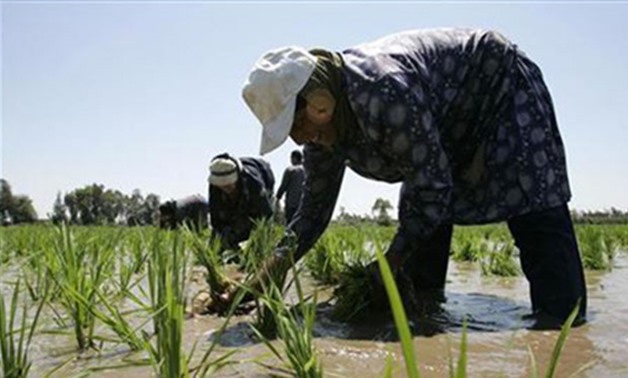
A laborer transplants rice seedlings in a paddy field in the Nile Delta town of Kafr Al-Sheikh, north of Cairo (Reuters)
CAIRO - 23 March 2020: The ministers of irrigation and agriculture agreed to allow farmers, who committed the violation of rice cultivation in non-designated lands, to pay the fines in installments over two years.
They also signed an agreement to regulate the cultivation of bananas within a strategy to manage water intensive crops. That came in a meeting held on Monday to discuss national plans and ongoing projects.
The ministers reviewed the status of lands lacking irrigation water, and infrastructure projects.
The ministers conferred over the introduction of modern irrigation systems in light of the water-related challenges Egypt is facing.
The ministers examined possible incentives to encourage farmers to switch to modern irrigation methods,such as sprinklers, as well asdripping and subsurface irrigation,andto resort to cultivating crops that consume less water. Modern irrigation is being introduced in all newly reclaimed lands, and will be generalized all over the country according to a timeline that is being set.
In 2018, the government drafted a law making the installationof modern irrigation systems all over the country the responsibility of the Ministry of Irrigation and Water resources. The draft law provided that a payment plan would be set for land owners to reimburse the costs
CAIRO - 8 December 2018: The government submitted to the House of Representatives amendments to law no. 38/1976 on agricultural land maintenance including articles 1, 2, 3, 4, and 6. The goal of the amendments is rendering the development of field irrigation systems the responsibility of the Ministry of Agriculture and Land Reclamation.
The ministers displayed the progress achieved in certain projects. A case in point is Marashda Canal, which is being filled with water. The next step will be installing lines for farmers to cultivate 12,500 feddans.
The digging of the Marashda Canal started in 2000 in Qena governorate to irrigate 30,000 feddans. The canal stretches for 26 feddans, and entered service in 2007 for just three days because of a technical mistake that caused the pumping system to fail.
In 2017, the canal, worth LE2 billion, became part of the 1.5 million-feddanproject launched by President Abdel Fatah al-Sisi.
Both ministers agreed on partially cleaning Kafr El Sheikh’s Khashaa agricultural wastewater canal.

Comments
Leave a Comment